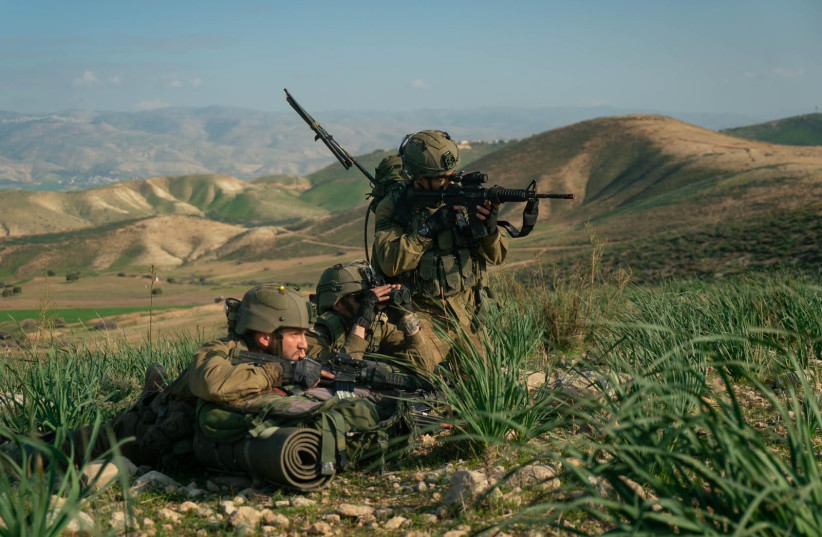Troops from the IDF’s 890th Paratroopers Battalion held a week-long drill simulating war on the northern front against Hezbollah while keeping a watchful eye on the country’s explosive southern border as tensions rise in Jerusalem’s Sheikh Jarrah neighborhood.
The exercise saw troops spend two-and-a-half days simulating defending Israeli communities along the border from infiltrations by the group’s Radwan forces, which are expected to try to take over communities in the next war before “crossing” into Lebanon where they would fight deep behind enemy lines.
During the drill, troops under the command of Deputy Commander of the 890th Battalion Maj. Yochay Ben Ami were joined by combat engineers and tank units, as well as with Israel Air Force platforms during parts of the exercise.
The drill, he said, “simulated cooperation with other forces deep inside Lebanon. It strengthened multi-force work and shows how strong we can be when we work shoulder-to-shoulder.”
Ben Ami explained that in the 10 years that he’s been in the military, it was one of the toughest drills he’s taken part in due in part to the harsh winter weather that troops faced.

“It was a week-long drill in bad weather where we drilled for war in the North,” Ben Ami said. “It was a challenging drill where soldiers walked hundreds of kilometers. It was cold, it was raining and we got wet but the troops were able to deal with the challenge posed by the bad weather coupled with heavy weights on their backs.”
Israel and Hezbollah fought a deadly 33-day war in 2006. That conflict came to an end under UN Security Council Resolution 1701, which called for the disarmament of Hezbollah, for withdrawal of the Israeli Army from Lebanon, for the deployment of the Lebanese Army, and an enlarged UN force in the South.
But in 16 years since the last war between the two, Hezbollah has morphed into a battle-hardened terrorist army that is waiting for the order to attack.
Radwan operatives are expected to be at the forefront of any Hezbollah attack against Israel, infiltrating into Israeli communities along the border to kill as many civilians and troops as possible, accompanied by a massive barrage of rockets, mortars, anti-tank missiles and more.
In addition to infiltrations by Hezbollah’s Radwan fighters, the Shi’ite terrorist army is estimated to have 130,000 rockets and mortars. Some 2,000 rockets are expected to be fired toward Israel each day by the group from Lebanon should a war break out.
The next war, Ben Ami told The Jerusalem Post, “is not going to be like 2006. We will be much better prepared, we will protect our communities. Hezbollah will be hit hard. It is not worth [if for] them to start another war with us.”
While Ben Ami explained that it’s unlikely that a war could break out, “It can come as a surprise, it could happen tomorrow. But if it does, Hezbollah will be sorry that they started a war.”
However, if a war breaks out with Hezbollah, it will not be confined only to the northern border but will see rocket attacks from Gaza as well as violence in the West Bank, similar to what happened in May during Operation Guardian of the Walls.
The last war with terrorist groups in the blockaded coastal enclave broke out after Hamas fired seven rockets toward Jerusalem following clashes in the flashpoint neighborhood of Sheikh Jarrah and the Temple Mount.
“There is a direct correlation between what happens in the West Bank, Sheikh Jarrah and an escalation with Gaza,” Ben Ami said.
Dozens of rockets were also fired in May into northern Israel from Lebanon by Palestinian groups and Hezbollah, causing incoming rocket sirens to sound in Haifa for the first time since 2006.
Looking ahead, Ben Ami said that “The South is more likely to break out in war than the North. This is something that can happen at any moment.” He said that Israeli retaliation to incendiary balloons or infiltrations might cause Hamas to respond, which can further deteriorate the situation.
However, unlike Operation Guardian of the Walls, which relied heavily on airstrikes, “there might be a ground maneuver next time,” Ben Ami said.
No matter if it’s on the northern or southern front, Israel’s enemies “will be hit very strongly,” he warned. “It will be stronger than what we did in May.”
